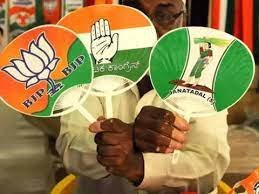Karnataka, a southern state in India, is witnessing a significant event today as its residents head to the polls to elect a new government. This election holds high stakes for both the Bharatiya Janata Party (BJP) and the Indian National Congress, with a total of 2,615 candidates competing across 224 assembly constituencies. The electoral process is taking place across an extensive network of 58,545 polling stations, including auxiliary polling stations, ensuring widespread access for voters. Notably, the election also welcomes a substantial number of new voters, with 42,48,028 individuals having been registered to cast their ballots.
The electoral battle in Karnataka has garnered significant attention as the state has a history of closely contested races between the BJP and the Congress. Both parties have actively campaigned across the diverse regions of Karnataka, vying for the support and trust of the electorate. The BJP, currently holding power in the state, is seeking to retain its position, while the Congress is determined to make a comeback after its defeat in the previous election.
The number of candidates contesting in this election reflects the vibrant democratic nature of Karnataka. With 2,615 individuals throwing their hats into the political ring, voters are presented with a wide array of choices, ensuring a robust democratic process. These candidates come from various political parties as well as independent backgrounds, each representing different ideologies and visions for the state.
To facilitate a smooth and inclusive election, the Election Commission of India has worked tirelessly to set up polling stations across the state. The sheer magnitude of 58,545 polling stations, including auxiliary ones, highlights the commitment to ensuring that every eligible voter has access to exercise their democratic right. This extensive network of polling stations aims to minimize inconvenience for voters and maximize participation in the electoral process.
Furthermore, the addition of 42,48,028 new voters demonstrates the growing engagement and interest of the youth in shaping the state’s future. The inclusion of these fresh voices brings new perspectives and aspirations to the forefront, potentially influencing the electoral outcome. The political parties have recognized the significance of these new voters and have focused their efforts on reaching out to them, hoping to secure their support.
As voters line up outside polling stations, there is a palpable sense of anticipation and enthusiasm in the air. The people of Karnataka are keenly aware of the importance of their votes and the impact their decision will have on the state’s governance for the coming years. They have the opportunity to shape policies, determine the developmental trajectory, and address the key issues faced by the state.
The election results in Karnataka will not only determine the composition of the state assembly but also have implications at the national level. Karnataka, with its sizable population and diverse demographics, plays a crucial role in shaping the political landscape of India. The outcome of this election may influence the political dynamics in the country, impacting the policies and governance pursued by the ruling party.
As the day progresses, polling stations will witness a steady stream of voters exercising their democratic right. The electoral process in Karnataka, with its extensive candidate list, widespread polling stations, and the inclusion of new voters, represents the essence of a vibrant democracy. The final verdict will emerge after the votes are counted, and the state will eagerly await the results that will determine the path it takes in the years to come.


